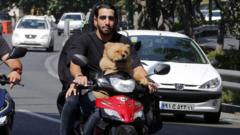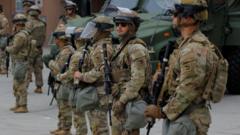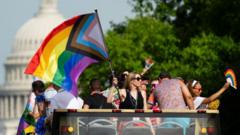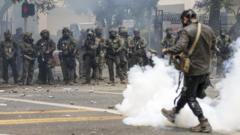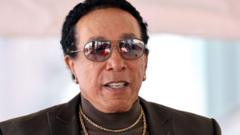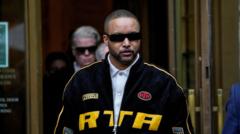Immigration-related protests have erupted in Los Angeles following a controversial deployment of National Guard troops by President Trump, igniting tensions between state and federal authorities.
Protests Spark Tensions in Los Angeles Over Immigration Raids

Protests Spark Tensions in Los Angeles Over Immigration Raids
In response to immigration enforcement actions, National Guard troops are deployed in Los Angeles amid escalating protests.
The streets of Los Angeles have turned into a battleground over immigration policy as President Trump has ordered the deployment of at least 2,000 National Guard troops to combat ongoing protests against immigration raids. Approximately 300 troops have already arrived, with more expected shortly. Tensions surged when law enforcement responded with tear gas and crowd-control measures against demonstrators congregating outside a downtown detention center.
California Governor Gavin Newsom condemned Trump's actions, claiming a violation of state sovereignty with the federal deployment occurring without his consent. In a pointed statement, Trump labeled any protest impeding immigration enforcement as “a form of rebellion,” a comment that underscores the political stakes involved. Newsom labeled the decision "purposefully inflammatory," highlighting the deepening divide between the Democratic state and the Republican administration.
The protests started in downtown Los Angeles and quickly spread to the nearby city of Paramount, which has a significant Latino community. As these events unfold, analysts observe that Trump may be seeking to engage in a political battle with Newsom, framing this confrontation as an essential part of his political agenda. Widespread implications are being noted, including concerns expressed by soccer fans in the lead-up to next year’s World Cup about the risks of immigration sweeps during the event.
As the situation continues to develop, the community's response and the actions of authorities will likely shape the ongoing narrative around immigration policy in the United States.
California Governor Gavin Newsom condemned Trump's actions, claiming a violation of state sovereignty with the federal deployment occurring without his consent. In a pointed statement, Trump labeled any protest impeding immigration enforcement as “a form of rebellion,” a comment that underscores the political stakes involved. Newsom labeled the decision "purposefully inflammatory," highlighting the deepening divide between the Democratic state and the Republican administration.
The protests started in downtown Los Angeles and quickly spread to the nearby city of Paramount, which has a significant Latino community. As these events unfold, analysts observe that Trump may be seeking to engage in a political battle with Newsom, framing this confrontation as an essential part of his political agenda. Widespread implications are being noted, including concerns expressed by soccer fans in the lead-up to next year’s World Cup about the risks of immigration sweeps during the event.
As the situation continues to develop, the community's response and the actions of authorities will likely shape the ongoing narrative around immigration policy in the United States.

